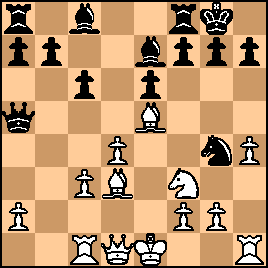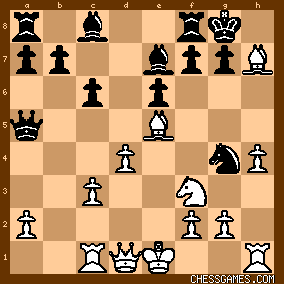KEG: Post II
Marshall's pawn sacrifice on move 11 was perhaps speculative, now Marshall seemingly off the rails: 14. h4?!

click for larger view"?!"--(Soltis)
"White threatens a possible sacrifice of his Bishop on h7..." (Gunsberg) A true coffee-house move. Marshall like King-side attacks, but 14. Ne5 or 14. 0-0 looked more sensible. But one thing can be said for the text; it obviously unnerved von Scheve, who now fell to pieces. With 14...c5 or maybe 14...b6, von Scheve would be nicely placed and Marshall would have been hard-pressed to justify his super-aggressive play. Gunsberg claimed here that 14...h6 was "absolutely necessary," but this is nonsense. Black is probably still for choice after 14...h6 15. Ne5, but Black had better options. But instead of those better options, von Scheve played: 14... Qa5

click for larger viewGunsberg notwithstanding, Black is not only not lost but was pretty clearly still better (though not as well placed as he would have been after 14...c5 or 14...b6). 15. Be5

click for larger view Gunsberg, who was still laboring under the delusion that White was near-winning, said that 15...h6 was the only way to "prolong the game." More nonsense. While Black would probably still have been better after 15...h6, he would do better than 15...c5 or 15...b6 or maybe 15...Bd7. The big question here is whether von Scheve could just have played 15...Qxa2 (16. Ng5 h6 17. Bb1 Qd5 18. 0-0! My best guess is that Black would still emerge ahead, but I'm not sure I would want to venture this against an attacking genius such as Marshall. But all this became moot when von Scheve played the much weaker: 15... Ng4?

click for larger viewGunsberg called this the "losing move," though claiming [mistakenly] that Black was already in trouble. Soltis also seems to believe the game was now lost for Black since Marshall now had: 16. Bxh7+!
"!"--(Soltis)
As <fredthebear> so nicely put it, Bxh7+ was "begging to be played." 
click for larger viewvon Scheve was plainly in a tough position, but was he lost? | 




